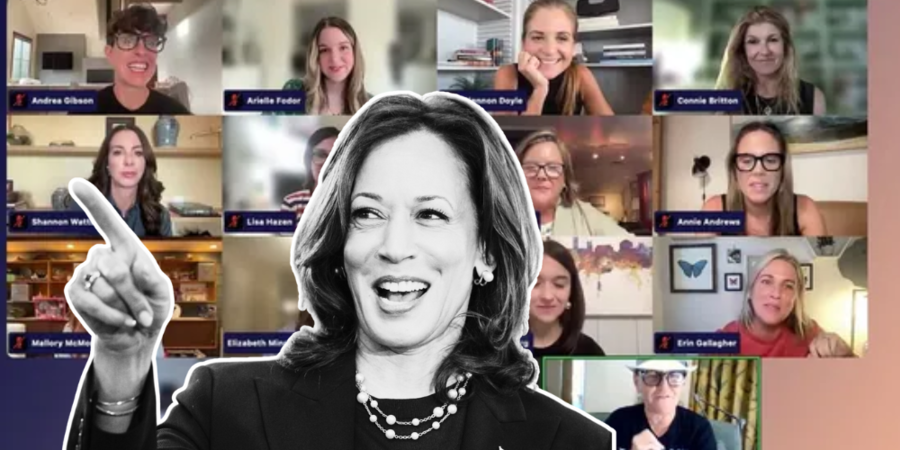
ADAM COLEMAN: Beware of Karens for Kamala
The problem with identity politics isn’t just that it makes victims out of people who don’t feel victimized, but it often propels narcissists into the position of saviors of society.
With the excitement surrounding Kamala Harris being the presumptive Democratic nominee after Biden’s re-election resignation, identity-obsessed leftists are seizing the opportunity to make this election be about themselves in the most public of displays.
Witness a recent and deservedly infamous Zoom call, dubbed “White Women for Kamala Harris,” organized by Shannon Watts. And as you might be able to tell from the name, the participants on this call — who were joined by notable women like the singer Pink and soccer star Megan Rapinoe along with tens of thousands of regular voters — were not exactly the model of mainstream American thought.
“How do we use our platform and our privilege to do the same thing Black women and men had done on their calls? I had written a piece called ‘White Women Have 100 Days to Help Save the World’ and it was being shared a ton,” Sharron Watts stated in an interview with “The Cut.”
Watts continued, “Brittany Packnett Cunningham said, ‘Your whiteness will not save you from what the patriarchy has in store for you.’ I think more and more white women are starting to realize that.”
During the call, a social media influencer, Arielle Fodor said, “As white women, we need to use our privilege to make positive changes. If you find yourself talking over or speaking for BIPOC individuals or God forbid correcting them: just take a beat. And instead, we can put our listening ears on. Use the privilege you have to push for systemic change.”
Notice anything about these quotes? Here, I’ll help you: none of them have anything to do with what Kamala Harris will actually do for the country. Because, for the people talking, helping America obviously isn’t the point. Rather, their entire motivation is less about putting the most qualified, deserving candidate into office than it is about their ability to tote their membership in a “historical” movement based entirely on identity. Seen this way, Kamala is merely a pawn; a fashion accessory they can brandish to the world to show what good people they are for being brave enough to choose someone who doesn’t look like the typical presidential candidate.
The organizers claim they were “answering the call” to save America, but the call was coming from inside the house. Even Watts’ article title is a narcissistic admission of wanting white women to count the days until they can supposedly save the world.
I’m not just speculating here. As a black man, I know all too well that affluent progressive white women often believe they hold a unique privilege over someone like me. That they insist on using this supposed inherited elevated ranking to “uplift” people like me is simple condescension. Last I checked, we didn’t ask for their help, but to them, that doesn’t matter. To them, we’re always victims and they need to save us, regardless of circumstance.
To borrow a term from the post-modernists, this kind of thinking is nothing but race essentialism, and it plagues the Democratic party. Forget their talk of “empathy.” The actual reason for this is obvious to anyone with a pulse: Democrats have transformed the fact that statistically, certain demographics vote Democrat more often than others into an expectation that those groups will always vote Democrat simply because of their immutable characteristics. Why else do you think President Biden said any black person voting for Trump “ain’t black” in 2020? He’s not alone. I’ve lost count of the number of affluent leftist white women who portray themselves as racially tolerant and supportive of all “BIPOC individuals,” only to viciously call my blackness into question if I decide to withhold my vote from their chosen candidate. Because at bottom, none of this is about empathy: it’s about using black leftists as convenient puppets for the selfish policies favored by these obvious Karens.
And the worst part of all? This strategy might be working. Say what you like about the Karens for Kamala, but they helped raise millions of dollars in a matter of hours for the Harris campaign, a fundraising success so drastic that it has already inspired other identitarian copycat calls, as well as renewed enthusiasm for identity-based political collectivism. Taken to its logical conclusion, as I fear it will be, this would portend a complete regression into overt political separation based on immutable characteristics, pitting faction against faction for attention and ridding ourselves of what we have in common as Americans. And no, contrary to what the Left wants to pretend, this will not advantage black people. Rather, it will favor whichever demographic can generate the most money for a political campaign or party. That demographic will then garner the most attention, to the point that they are allowed to speak for and overshadow the interests of everyone else.
So beware of the Karens for Kamala. They might be raising a bunch of money for the candidate you like right now, but what happens when their financial class advantage takes over the Democratic party? They’ll be able to sway the political discussion heavily away from traditional working-class concerns (including, it must be said, among working-class blacks) like the economy and immigration toward abortion and the patriarchy. What happens when one or both parties is taken over by such niche concerns? In that moment, politics will become the purview of the genuinely privileged, who will choose our presidents on the basis of small, vanity concerns, while the rest of us wait hopelessly for them to help.
This Story originally came from humanevents.com
Stay Updated with news.freeptomaineradio.com’s Daily Newsletter
Stay informed! Subscribe to our daily newsletter to receive updates on our latest blog posts directly in your inbox. Don’t let important information get buried by big tech.
Current subscribers:








